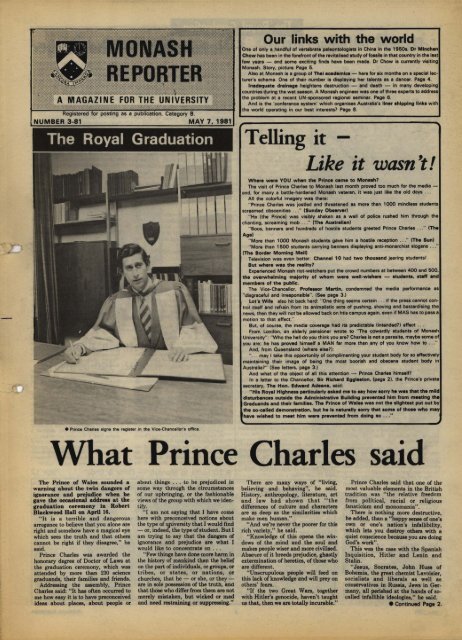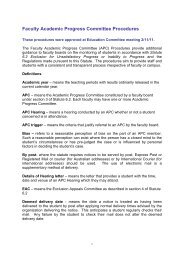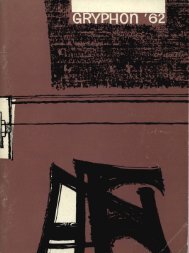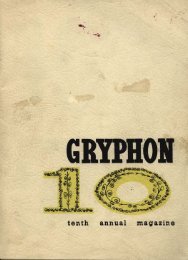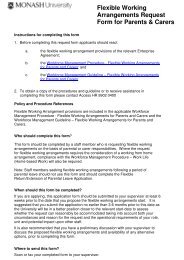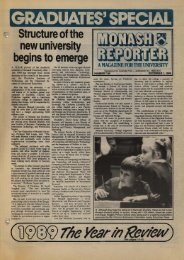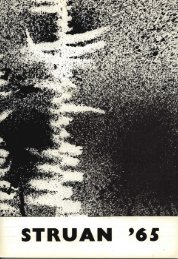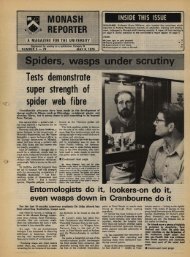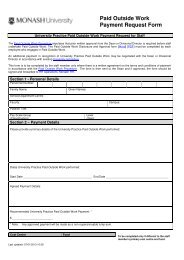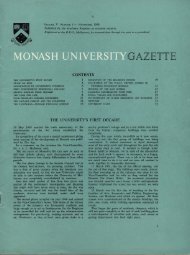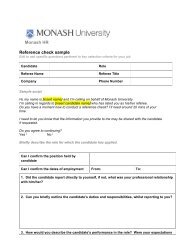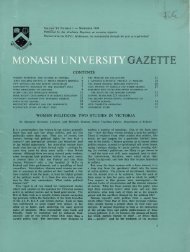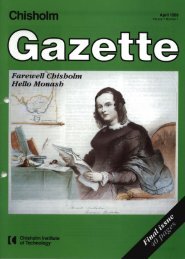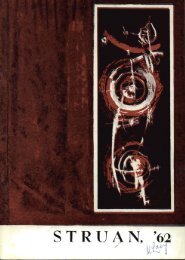No.3-81 May - Adm.monash.edu.au - Monash University
No.3-81 May - Adm.monash.edu.au - Monash University
No.3-81 May - Adm.monash.edu.au - Monash University
- No tags were found...
You also want an ePaper? Increase the reach of your titles
YUMPU automatically turns print PDFs into web optimized ePapers that Google loves.
Letter frum the Royal Party..._NatiOimlism - the dangerThe Hon . Edwa rd Ad.anaRoyal Party on Tour17th Apr1l , 198 1.The Pr i nce of Wales has a sked me to se nd you andyour co lleague. his very wa rmest thanks for your hOlpitalityat <strong>Monash</strong> Univer sity yes t erday, and above all, for t he honourdon. to HiS Royal Hiqhnesl by the conferr i ng of the OQgree ofDoc tor of Laws Honori l C<strong>au</strong>sa. The Pr ince of Wales is delighteet o have become a member of such a very luccesstul andd i stinguished univer sity.lI i s Royal Hlghnass particularly .sked ma t o s.y howsorry he wa . tha t the mild distur bances outside the<strong>Adm</strong>i nistra t i ve Bu i lding prevented h im from meeting t heGraduands and their f~iliel . The Pr ince of Wales was no tthe slightest put out by the so- called demonstration. but hei s naturall~' sorry that sOr.le of tholla who m.,~, have wishedto meet h i m we r e prevented f rom doing so.HiS Royal High ness much l ooks forward, as a new ~lemberof the Uni v e r s it ~ to returni ng to ~lon.lsh
'Ugly scenes'as others saw them Commenting in SOUND on the neW8paper andtelevision coverage of the vi.it of Prince Charles,the Vice-Chancellor, Prote..or Ray Martin, .ald:"In my opinion, it was 8 most 8ucce8Sfulgraduation. But certain sections of the media wentout of their way to emphasise, in a moat disgracefuland irresponsible fashion, the activities of a verysmall group of demonstrators."One television channel in particular gave 8 grosslydistorted view of the event. It sought to give theimpression that the crowd waiting to see the Princeof Wales after the ceremony consisted entirely ofdemonstrating students."Professor Martin went on: "I walked with thePrince to his car and at no stage did the party feelthreatened. There were many shouted comments some of a distasteful nature - but mostly goodhumoured."A lot of the pushing and shoving, in fact, camefrom the media representatives themselves as theytried to get clo~r to the Prince."Nearly everyone I've spoken to has put the crowdnumber at about 400 - of whom no more than one inFinding safety in the VC's office, Prince Charles discusses theday's events with Sir ~ich8rd Eggleston and Professor Ray Martin.The truth about the 'drowned-out' spee(h A week after .he visit, Prince Charles gave a talkat the South Australian Art Gallery, and he wasreported thus . j •" Prince Charles has decided that he has given toomany speeches of no consequence during hisAustralia tour,"But he reckons he did make one speech ofconsequence - at Melbourne's <strong>Monash</strong> <strong>University</strong>,"This, he said, was drowned by protestingstudents."It did NOT happen IWhat i. the truth of that epl.ode?According to a Commonwealth media liaison officerwith the Royal party the Prince did not say hisspeech was drowned by protesting students.His remarks, in fact, referred to the media's totalfailure to report any of the substance of his <strong>Monash</strong>address, preferring to concentrate almost wholly onthe activities of the "rent-a-mob" (the Prince'swords) outside che hall.The media officer said there had been numerousinstances of a similar kind. In Sydney. he said, thePrince spoke to about 1500 disabled persons in aspecial International Year of the Disabled Personrally.''This went virtually unreported. What seized themedia's attention was the fact that the Prince's chiefpolice officer had strained a monkey muscle and waslimping ..."For those who missed the Prince's 'drowned-out'address, Mon~8h Reporter summarises the mainpoints in this iasue. Copies of a full tzanacript can besupplied on request. (We'll even· play you a tape thatwill prove that the Prince was heard in completasilence!)ten would have been there to demonstrate. Newspaperand TV 'estimates' varied between lOOO and2000."It should be appreciated, too, that many were not<strong>Monash</strong> students, but outsiders, some brought to thecampus by buses.·"It is a pity that loose, inaccurate, 8en8ationalreporting should continue to give <strong>Monash</strong> an undeservedlybad name in the community."('The numbers of 'alien' demonstrators wouldhave been greater but for an unfore8een hitch: Twobuses apparently headed for <strong>Monash</strong> had a chanceencounter with a police roadworthine88 squad on thePrinces Highway. The occupants endured amiserable 9O-minute wait while the vehicles werejacked up and subjected to a most rigorousinspection.A member of the Prince's party was heard to saythat he recognised many of the demonstrators whodid make it to the <strong>University</strong> as people he had ...nat Footscray Institute a few weeks earlier when theDuke of Edinburgh was 8ubjectad to a similardemonstration.)• • • from a distanceThe Vice-Chancellor has received the followingletters:From Coolum Beach, Queensland ..•Dear Sir,In commenting upon the hostile reception recentlygiven Prince Charles at your <strong>au</strong>gust university, mayI take this opportunity of complimenting yourstudent body for so effectively maintaining theirimage of being the most boorish and obscene studentbody in Australia?<strong>Monash</strong> students are clearly obliged to work hardat maintaining this unenviable reputation, particularlywhen one realises that Australia is farahead of most other allegedly civilised nations whenit comes to tactless and mindless bad manners.Any visiting dignitary who is invited to <strong>Monash</strong> inany capacity obviously has to run the g<strong>au</strong>ntlet ofthis sort of uncivilised treatment should they besuspected of holding views anywhere to the right ofcentre in the dubious firmament of Australianpolitics.My heart really bleeds if this sort of conduct isgoing to become typical of the 'thinking' elementswithin our community. What hope will Australiansever have of building 8 homogeneous, idealistic,courteous, tolerant and caring society with the sortof example set by the academic louts of <strong>Monash</strong>placed periodically before them on the radio, TV orthe newspapers?And from London •••To: The cowardly students of<strong>Monash</strong> <strong>University</strong>, MelbourneWho the hell do you think you are? Charles is nota parasite, maybe some of you are; he has provedhimself a MAN far more than any of you know howto.Much as you have angered me, I still refrain fromcalling you 'pigs', as I believe in dignity.I'm an elderly pensioner, I have known starkpoverty, but it has not made me a rebel. Shame onyou for wanting to make life more difficult to a finegentleman, our Prince Charles.'TOP: The Prince glances back at the "violent" scenes thet greetedhis arrival. Centre: Giving the Occasional Address - thecelebreted 'drowned-out' speech that was heard in completesilence. Below: More "ugly" scenes as he leaves. Prince Charles'sprivate secretary says that the Prince was "not in the slightest putout by the so-called demonstration ..." (Royal visit photos by:Rick Crompton, Tony Mm., and Steve Morton.1MONAaH RI~ORTER3 M_y.19<strong>81</strong>
THAI ACADEMICS ON SIX MONTH VISIT Avec survey on international links The Australian Vice-Chancellor.' more than 400 pages long, and containsCommittee has just completed the 1497 separate entries on academicfirst survey of academic links links; 1284 of them with Australianbetween Australian tertiary universities and 213 with colleges.institutions and overseas A copy has been sent to the Library.universities and related institutions. Addition.al copies are available (at aThe survey was commissioned by cost of $5 each plus poetage) from thethe AVCC about 18 months ago AVCC, PO Box 1142, Canberra City,following considerable expansion of ACT,2601 •.academic links between Australianand overseas institutions.It will provide assistance to thePlants patentsAustralian Government in thedevelopment of its cultural, scientificand other ties with other countries, as Plant varietal rights - patents onwell as providing information for plants - is, so to speak, a thornyuniversities and other <strong>edu</strong>cational and issue.scientific institutions.Legislation covering such rights isWhat the survey sought to do was es due to be tabled in the Autumn sessiontablish what links had been of Parliament but plans are that it willestablished by Australian <strong>edu</strong>cational not be passed for six months to enableinstitutions other than through the for discussion.mal Australian-Asian Universities Co Making a contribution to the debateoperation Scheme. AAUeS, as it is will be speakers at a pre-dinnerknown, is funded largely by the seminar on plant patents beingAustralian Government through the organised by the <strong>Monash</strong> Law faculty'sAustralian Development Assistance Continuing Legal Education Centre forBure<strong>au</strong>. Tuesday, <strong>May</strong> 19.AAUCS was started by the A VCC 12 For further information contact Mrsyears ago to mobilise the resources of Lisa Cooke or Mrs Dot Grogan on ext.Australian universities to help 3377.strengthen universities in ASEANnations and New Guinea.Many of the new links described inTutor vacancythe survey have been establishedduring outside studies programs.In the foreword to the report of the A vacancy exists for the position ofsurvey, the Chairman of the AVCC's tutor in Roberts Hall.International Relations Committee, Applications - to be submitted asProfessor D.A. Low, said the survey soon as possible - have been invitedwas modelled on the British Council's from married members of <strong>Monash</strong> staff1974 survey of academic links. and married poetgraduate students.He said the main purposes of the An applicant's spouse, if academicallyAustralian survey were:qualified, may also be offered a• To provide source material for tutorship.universities and other interested The weekly accommodation rate forbodies wishing to establish, or be a married tutor is $24.64 or $20.44 ifinformed about, links with overseas both husband and wife are appointed.institutions.Accommodation includes private• To provide a guide for answering the bathroom and a kitchenette, althoughnumerous enquiries which the A vee, tutors are expected to take most ofuniversities and other institutions their meals in the Hall's dining room.receive from overseas institutions Application forme and furtherwishing to establish links.information may be obtained fromThe A VCC Occasional Paper the Halls admlni8traUve aa.latent,containing the results of the survey is Mrs. Eileen Rogers, ext. 2900_Fourteen ThaI academlCl are cur This year's group is more senior thanrently visiting Mon8lh for ahl: in previous years and includes Dr Parmonthsunder the Thai <strong>University</strong> nlch Tinnlmlt, Assistant .to the RectorLecturers Scheme.for Academic Affairs. Several topThe academics, all from the Prince ranking members of departments andof Songkla <strong>University</strong> in Hatyai in the head medical librarian at the ThaiSouth Thailand, wilJ be aiming to university are aleo in the group.increase knowledge and skills in theirsubject areas, academic Their program at <strong>Monash</strong> is in twoadministration and modem <strong>edu</strong>cation parts. The academics spend two days atechniques.week with HEARU undertakingThe Scheme, funded through the studies in 8uch aspects as courseAustralian Development Assistance planning, teaching techniques,Bure<strong>au</strong>, is organised by the Univer· applications of <strong>edu</strong>cationalsity's Centre for Continuing Education technology, 888essment methods andin association with the Higher the planning of teaching resources. OnEducation Advisory and Research Unit the other three days they join a hootand departments. This is the fourth department covering their own interestyear in which the Scheme has areas to observe and participate in itsoperated.day to day operation.Vllitlng Thai lcedemic. Ind. in braeke ... the depertmenta to which they Ire ItteChed ItMonuh: front row. Mr Pinei Orrunaroege (Mechlntcal Engineering). Mlu Preuich.tf. Suithlvll1i(Educat~) . Miss Woraouch Ti<strong>au</strong>trakul (BiornecUc.1 library). and M, NKi Rrttrohonbhun (Zoology);centre. Mrs Suman<strong>81</strong> Jitpituk (Anthropology .nd Sociology). Mrs Jongpid $i,ir.t (<strong>Adm</strong>inmratiwStudies'. Mr. Boonchuay Chetanasena (Geogrephy). Mrs Anharpom Chotnipet (Education) end MissKritlri Samabuddhi (Education); beck row, Mr Vudhipong Teehedernrongsin (Comput... Science). OrSunthorn Sotthibandhu (Zoology). Or Swei Uemkeew (Education), Mr Peltoon Bunnjewlht (French)and Or Parnich Tinnimit (HEARU).:~,~;,\!j;~." ». ' ,)4." ,:1f\'t·.!"::':~f~,.io~·wi~~.~\!'-"n:. •• " , •••r,;.w.r........~~• Pr.kelchetre Sukhsv..ti with two of her danee students. Toni Pusterlll Ueft) and M.ry-.nne Titler.Music sludents and staff play instruments of the Mahori behind.'Ginger' leads the dance Students in <strong>Monash</strong>'s Music play two of the instruments of thedepartment this year are being orchestra or one of the instrumentsoffered. a novel opportunity - to plus take tuition in dance. This i8 thelearn Thai dancing as part of their first time the dance option has beenformal study.available.(The skiJIs of another Thai visitor, The students are in third and fourth Panya, t<strong>au</strong>ght to members of the year and are taking the unit MU8ic of department when be was here in 1976, the Southeast Asian Mainland. are being passed on to students inTheir instructor in dance is Mi.1 tuition by Greg Hurworth on stringedPrakaichatra Sukhsvasti - known instruments and Poedljono onin the department as "Ginger". Miu percussion) ,Sukhsvasti is visiting <strong>Monash</strong> for six Miss Sukhsvasti is teaching twomonths with 13 other academics under forms of Thai dance - the Rsmwongthe Thai <strong>University</strong> Lecturers' (80cial dancing) and classical dance.Scheme. Her home institution is the She learned dancing as a child - inPrince of Songkla <strong>University</strong> (see informal classes at her cousin's houseseparate story) where she specialises in and has maintained an interest in it asthe teaching of Engli8h as a second a leisure activity ever since.language.Miss Sukhsvasti points out that sheThe course, conducted by Reader in is not a formal teacher of classicalMusic, Dr Margaret Kartoml, sur dance. To hold such a position a Thai,veys extensively the music of Thailand after long study, must reach the stagebefore going on to that of Burma, Laos, of being "knighted". Her sister i8 suchKampuchea and Malaysia. Thailand a teacher.has been in contact - peaceful and To respect tradition, 88 a "nonnon-peacefulwith these teacher", Miss Sukhsvasti cannotneighbouring countries over the touch her <strong>Monash</strong> students as part ofcenturies and her varied musical forms their tuition. What she can do,may be seen as a bridge between the however, i. explain the movementsmusics of mainland Southeast Asia. and act as a model for the students toThe course focuses on the music of follow.the Pi Phat, the Thai percussion • Students taking the subject will takeorchestra, and the Mahori 88 it is part in a public performance featuringcalled if strings are added.Thai music and dance on Thursday,As part of the subject's June 25 · at 1 p.m. in the Musicrequirements, students must learn to <strong>au</strong>ditorium in the Menzies building.<strong>May</strong>. 19<strong>81</strong>4 MONAIH ftll'OftTeft
• An elementary dreillltge ay.tern - doubling ... sewer - in a third world country.Aid for developing areas on drainage Each wet season, elemeDtary orpoorly designed drainage systems indeveloping countries magnify thedevastation or ftoods - in both thedeath and damage c<strong>au</strong>sed by theuncontrolled surge ot water and,with it. stagnant collection, thesubsequent spread or dieeaaes suchas typhoid and cholera.Many of the poorest Dations,however, still must divert all theirresources to meeting the basic day-todayneeds of their people - feeding,clothing and housing them - and theadoption of advanced technologies foreffective drainage is some years off.When these countries are in aposition to address such problems, thesolutions they implement must betailored to fit local conditions - takinginto account such aspects as the socioeconomicstructure and the ability ofpeople to accept change. Technology tosolve a problem in Australia cannot betransplanted without modification toBangladesh, for instance.These were some of theconsiderations of an Asian regionalseminar on urban hydrology held inManila recently under the <strong>au</strong>spices ofthe United Nations DevelopmentProgram, the World MeteorologicalOrganisation and the Economic andSocial Commission for Asia and thePacific.One of three experts conducting thesemina r was a lecturer in CivilEngineering at <strong>Monash</strong>, Dr GaryCodner./'Dr Codner returned to <strong>Monash</strong> thisyear as a member of staff afterstudying here from 1969 to 1974. In theintervening years he worked as ahydrological engineer with the SnowyMountains Engineering Corporation.Part of his time with the Corporationwas spent in Indonesia where he wasinvolved in work on flood and run-offestimates, flood mitigation, floodforecasting and master plan studies forwater resources development.The seminar attracted participantsfrom 10 countries - Bangladesh,China, Hong Kong, Malaysia,Pakistan, South Korea, Sri Lanka,Thailand, Vietnam and thePhilippines.In an early session, Dr Codnerdiscussed the basic pre-requisite forwork in urban hydrology - thecollection of local data of a suitablequality and quantity, an exerciseinvolving both engineers andmeteorologists."I pointed out that projects in urbanhydrology ideally require a long leadtime - that data should be collectedMev.''''over a five to 10 year't'period before aproblem is addressed. It is importantthat countries should be starting tocollect such data now, even if schemesare many years off. At the momentsolutions are often based on overseasparameters combined with guesswork,tI Dr Codner told Reporterrecently.The other speakers at the seminardealt with such topics as floodforecasting and the construction ofsimple urban rainfall run-off models.Dr Codner later discussed more complexmodels requiring computerapplication.He said : "Part icipants wereintroduced to the tools that could beused immediately and, at the sametime, made aware of the morecomplicated techniques for problemsolving that exist if needed."Dr Codner said that a problem thatmust be tackled at the same time asthe technical ones on drainage is thatof public <strong>edu</strong>cation.He said: " What is nee~d is a clearunderstanding of the correct use ofdrainage systems."Where such systems exist they areoften used for disposal of refuse. Thedrains become sewers and are 8 Potentialhealth hazard. A build.up ofsediment and household refuse occursin the dry season which impedes thedrains' capacity to carry run-off waterin the wet season.Dr Codner said: "Educating peopleagainst using drains in this way is 8problem not to be underestimated,however. You may be attempting toundo a way of life that has existed forgenerations and future urban drainagedesigns in such areas must makeallowance for such factors".He said that universities such as<strong>Monash</strong> make another, more longterm,contribution to urban hydrologyin Asia by their intake of engineeringstudents from that region.• Set to gol At 6.15 a.m. each weekday - wheamost are Itill oblivious to theday's existence or, at best,observing It through a hair·opened eye - Jaclde Turney,technical assistant in CivilEngineering, is out on a five toeight kilometre run in theEndeavour Hills area.After work, Jackie puts on her runningshoes for another one to two hoursduring which she covers a distanceof 13 to 30 km.On Sundays it's a 24 to 32 km. run,often through Sherbrooke Forest .Saturdays are spent in competitiveracing during the seasoll.lt is this dedication which has takenJackie, who is 23 this month, to aposition in the top five or so womenmarathon runners in Australia.Recently she came second in thewomen's section of the Nike Internationalheld in Canberra. Firstplace went to a New Zealander,Judith Hine, making Jackie thefirst Australian across the line.On <strong>May</strong> 24 she will take part in theAvon Marathon (a marathon race isover 42.2 km.) in Sydney. Last yearshe came 11th in this event. If shecan better that this time to one ofthe first three plac.. she will winthe right to compete in Canadalater this year. If she doesn't shewill take part in the AustralianChampionships to be held inMelbourne in July.As a grand ambition Jackie is startingto eye Los Angeles in 1984.Jackie, who holds a Bachelor of Artsdegree from <strong>Monash</strong>, comes from asporting family which migratedfrom Britain to Australia aboutnine years ago. Her mother is hercoach.Jackie is motivated in her pursuit"simply by the love of running" something she has held since shewas 16. Before that she was keen onswimming.As well as mara thons, Jackieparticipates in cross country andother distance events and competedin the last track season. But herforte, she says, is the marathon.She has a day off from her ritraining program only af\. ~ _marathon or in the case of injury.Does she ever envy the silent, staticmajority still tucked up when sbe'sout running?"When it is cold and rainy sometimes Ido - but not often," she replies.And, in her case, Jackie disputes thenotion of the loneliness of a longdistance runner. She trains in theevening with a friend and citessocial contact as one of the reasonswhy she enthusiastically pursuesher sport.Our capability lund Australia'. national technologicalcapability is under attack, ProfessorLance Endersbee, Dean ofEngineering at <strong>Monash</strong>, told the an·nual conference of the Institution ofEngineers, Australia, recently.Professor Endersbee, retiringpresident of the Institution, was givingan .address on the topic Engineeringin a Participatory Democracy.He said: H(Our technologicalcapability) is under pressure fromoutside Australia by normal marketforces in a competitive technologicalworld; it is being eroded from within byanti·technological attitudes which areeasily seen in <strong>edu</strong>cation, the media,and in politics."Within 10 years, he claimed,Australia could lieasily be veryvulnerable" ."If our national technological poten·tial continues to be eroded by anti·technological attitudes, especially inthe schools, and ifour young people arenot given the encouragement todevelop their own individual potential,then we 88 a nation become even morevulnerable to exploitation anddomination by othera."Professor Endersbee said that aprevalent hostility to technologicaldevelopment, and the rise of anti·technological and anti.professionalattitudes, placed greaterresponsibilities on professionalengineers to participate in public af·fairs - both <strong>81</strong> individua\a and, collec·tively, through the Institution ofEngineers, Australia.To date, he said, engineers htl.,-etended to equate professionalindependence with political neutrality."As a consequence, neither(political) party receiv .. sound profes·sional advice in the formulation ofpolicies for national technologicaldevelopment. It he said."As a further con..,qilence, the dooris left open for otheh of nontechnologicalor anti-technologicalpersuasions to influence thesepoli~ies."Public discussionProfessor Endersbee said there were"real problems" in the publicdiscussion of complex engineeringissues."Our large organisations, very oftenwith many profeuionals. are eaential·Iy monolithic and tend to presentproposals in the public arena onlywhen they are already resolved. Inaddition, the professionals in suchorganisations are often constrained bytheir own organisation in presentingtheir own personal views in the publicarena, It he said."Thwr when any public controversyarises, the vocal opposition groupo inthe community are often ill·informed,while on the otber side there ia only onespokesman or alternatively a non·technical Mini.ter of the Crown
Meet 'Mastermind' Fritz, 72 Last night <strong>Monash</strong>'s oldest Artsstudent, Fritz Joseri, tooksecond place in the sixth heat ofABC-TV's "Mastermind"program.Mr Josefi. who turned 72 late lastmonth, answered correctly 14 of the16 questions on his special subject,Wagner.He is in the second year, full-time, ofhis Arts degree. If he successfully- llpietes honours work he hopes to_ ..-on to higher studies - eventuallya Ph.D.Mr Josefi's ambition along the line isto write a history of Vienna fromRoman days to the present. It is the·city he left on November 11, 1938 the day of the pogrom of Jews and to which he has not returned.Mr Josefi, who is .Jewish, and his wife,who was not, left Vienna by rail,travelling third class. The train washalted and passengers travellingfirst and second classes weredetained.oHock' presenting the engineering case, withall supporting professionalscon
The word in transport in the '80s is 'dere<strong>au</strong>la!ion', but • • • •Liner shipping retnalns anchored to the 'conference system' talked to ReporterDr Keith Trace. whobefore goin~ onWhile the trend in the 1980& may he toward deregulation in domestic road, ran and air and international air transport,there i. one form - liner ihlpplng - which i. highly regulated and can he espected to remain 80. leave. asks: :AreAustralia ~ best interests served?' Liner ships carry Australia's import/exportof general cargoes.The regulation of liner shipping is imposedby the ship owners through what isknown 8S the conference system and hasbeen supported by successive AustralianGovernments since the 19309.What has been termed the"stranglehold" of the conference system,while largely accepted, has not gone completelyunchallenged, particularly in thelast 10 or so years. In fact it has becomevery much a "live" issue among the largerAustralian shippers such as the Wool Boardand the Australian Meat and LivestockCorporation.One of the few Australian academicsworking in the area of shipping economicsis Dr Keith Trace. senior lecturer in<strong>Monash</strong>'s Economic History department.Grigor ReportDr Trace questions whether Australia'sinterests an best served by the conferencesystem which operatee on every importantmulti·owner trade route out of the country.At very least he believes we ahould examinethe poasibilities opened up by VariOU8stages of deregulation - 80mething theGovernment appears not to have done byaccepting the recommendations of theDepartment of Transport'8 lateet (1978)study, "Report on a Review of OverseasCargo Shipping Legialation" (the GrigorReport).His belief is that Australia's economic in·terests would be better served by a morecompetitive system than the conferencespermit.Dr Trace explains the nature of shippingconferences:"A conference is a cartel, or associationof owners servicing a particular trade route,formed to protect its members' interests bylimiting competition between member linesand by countering outside competition, to<strong>au</strong>gment profits and to provide regularsch<strong>edu</strong>led. services."Conferences determine freight ratelevels and may allocate sailings, allot a setshare of available cargo to member linesandlor operate a revenue poolingagreement. "Conferences can be "open" or "closed".Open conferences - which are confinedalmost exclusively to trade routes radiatingfrom >the United States - impose norestriction on entry other than that of requiringa new member to charge postedfreight rates and observe conference rules.In contrast, lines can only join a "closed"conference with the consent of existingmembers.Dr Trace says: "The strength of a can·ference lies in its power to ensure shipperloyalty and thereby to exclude outside competition."To encourage loyalty, conferences in·variably adopt either a contract (dual rate)or a deferred rebate system, giving 'loyal'customers - those who agree to shipspecified cargoes solely by conference vessels- the benefit of lower freight rates."Dr Trace says that a major determiningfactor in liner conference freight rates is anhistorical 'rule-of-thumb estimate of "whatthe traffic can bear." Rates vary from commodityto commodity.Raie changes are made on an across-the·board basi •.It baa been argued that conference lin ..make little effort to minimise coate butmerely p888 them on to the end·uaers on acost-plus basis, as is possible in amonopolistic situation.Support for the conference system hascome from the Australian Government and,historically, from shippers themselves.Arguments in its favour are that it offers arationalisation of shipping services withstable freight rate8 and regularity insailinp. This rationalisation, it is argued,would be destroyed in tbe competitiveenvironment.In 1930 amendments to the IndustriesPYeservation Act opened the way for theAustralia to Europe Shipping Conferenceto ' close its membership and enter intodual-rate contracts with shippers.The shipping provisions of the TradePractices Act, introduced in 1966 andamended in 1971 and 1974, built on thestructure embodied in the Australian IndustriesPreservation Act, giving all out·ward conferences the right to close theirmembership and use dual-rate contracts.subject to the safeguard that they undertaketo negotiate with designated and ap·propriately constituted shipper associationsand that they have due regard to the"adequacy, economy and efficiency" of ser·vices.The recent Grigor Report "continues theAustralian tradition", in Dr Trace's words,by giving> support to the status quo onclosed shipping conferences. He 'Says thatthe Report was a "lost opportunity" for a~eeper probe into the nature of liner shippmg.His own view is that Australia ha, "givena lot ~way" by permitting closed conferencesto operate.Alternative policiesThe alternative policies, which hebelieves the Government should at leastconsider, are these:• The "halfway house" of encouraging asomewhat greater degree of competitioneither by legislating to replace closed byopen conferences and/or by encouraging>outside lines to enter a trade.• A move directly to A more competitiveenvironment through the introduction oflegislation to ban conferences and/or outlawconference practices such as the dualratesystem.According to Dr Trace the evidencesuggests that routes served by "open con·ferences" tend to be characteriHd by ex~cesa shipping capacity."On the other hand," he says, "thepresence of a price-cutting independent ina trade served by a 'cloeed' conference mayserve to keep the conference boneat. In a.world where second best rules lIuch asituation may be the beet attainable."He says that a government intending tomove in the freely competitive directionwould face intense lobbying from industrypressure groups, and he concedes that thereare valid objections to "trust busting" inshipping (several inquiries in the UK andthe US have concluded that unfetteredcompetition would be unlikely to lead to acontinuing and reliable service).This is what Dr Trace predicts would occurin the competitive situation:"In the absence of conferences, shipswould continue to be placed on berth frequently,although sailings would probablynot be on 80 regular a basis at present.Freight rates would be less stable than theyhave been under the conference system andthere is the possibility - though not in myjudgment the probability - of severe temporaryfluctuations in tbe level of rates.These fluctuations would, however, takeplace about a mean that would be lowerthan that of conference rates."Dr Trace says that one of the weaknessesin the Government's policy on conferencesis the belief that the powerful ranks of shipowners have a countervailing power in theform of a shippers' organisation.In practice, he says, the Australian Shippers'Council has been no match for theship owners who hold the balance ofbargaining power.For a start, he says, the shippers havenever been as united as the ship owne18.The larger commodity boarels, thOle cover·ing wool and meat for example, have beenprepared to negotiate separately to gain ad·vantage.Traditionally the ASC has supported theclosed conference system, favoring its pricereliability and service regularity.But Dr Trace says that, in the harshereconomic climate of the last 10 years,freight rates have begun to bite and it hasbeen these larger boards that havespearheaded questioning of the system.A catalyst in raising the shippers'awareness of the value of competition hascome in the form of the Belgian line, ABCContainerline.To date, independents (which, of course,have freedom of the seas and the right todock) bave posed Iittled threat bec<strong>au</strong>sethey have not been able to guarantee theirpresence, with a reliable service, over time.But with a long term contzact on anAustralian-American route 8S "security",.-'\Be is for the first time, offering a forceful,non-socialist and viable independent alternativeon the European route.Its marketing is aggre8sive. "Get adivorce, or at ,least a trial separation," theline's advertisements run. "If your profitmargins are suffering from high freightrates, you may be using the wrong shippingline. At ABC ContainerHne you'll find competitiverates which will r<strong>edu</strong>ce yourfreighting costs and add to your profita."Some of the large commodity boardshave swung their weight to transport partof their cargoes with the independent linewhile retaining contract rates with the conferenceliners.Shippers, in their new mood, madestrong representations recently to theGovernment which was planning to take uprecommendations of the Grigor Report inan amendment to the Trade Practices Act.The shippers argued that the amendmentswould strengthen the position of shipowners. The Bi1l has been shelved - per·manently, Dr Trace believes.Dr Trace points to shipping policy 88 asource of potential conflict between theUnited States and Australia.He says the countries take a differentphilosophical approach in which there is"real potential for clash."Current US legislation ensures that conferencesoperating to and from US portsmust be open to all ship owners wishing tojoin, subject only to financial. guaranteesand proof of ability to offer regular services.This "to~' aspect of operati9n8, as well 88"from", cuts across Australia's claim thatit has sole jurisdiction over movementa outof its ports.US legislation also requires that the USFederal Maritime Commi88ion approveconference agreementa (taking into accountthe criteria of anti-trust Acta) and con·tracts between conferences and theircustomers. Also it prohibits the deferred.rebate system.Going further, the US Department ofJustice has argued that the FMC has failedto properly administer the Shipping Actand that shippers' interests would be betterserved under an openly competitive systemwhich would lead to lower prices, greaterconsumer choice and more efficient allocationof resources. The Justice Departmentis currently threatening to investigate USAustralian shipping.ABC plans 'Degrees of Change' If you think you've been seeing Austr.li.n .ctor-director Bud Tlngwell ro.ming .round the c.mpulI.tely - you',. right.Bud hal been epending • lot of time INking out <strong>au</strong>ltabte k)c.tiOni for Ie,"" that the ABC TVdrama unit propo ... to Ihoot .t MOOIIh for • forthcoming production - OevrNI of Chllng••Filming for whIt i, IXpected to be the pilot .paode of I m.Jor televllion HTi.. will t.ka plac<strong>edu</strong>ring tht v.eetion. in the l'lt week of <strong>May</strong>.Mr Tingwetl. who il directing the production. II Men herl in the Union discuuing aapectl of theICriI)t wtth. from left: M..-garet McCluaky. acript editor: Carol_ , ...... ARiatant to the Warden ofthe Union; Max N~. deaigner; Glendli Byrne. _ltant director: and ~ Oott. MonnhStudent ThNtre Co-ordinator.For 101M of the ICIMI. the ABC IxpectI to amptoy up to 30 ttudlnt ed,..._.,., •MONUM II.POIlnIl
------==~~----Disco"elY_-The S4Kond in anoccasional serieson the UnivenilyCourtyards often contribute much to thegrandeur of. or lend a charming touch to.the long-established universities InAustralia and overlN•.At <strong>Monash</strong>. too. severel courtyardsprovide a quiet haven for the time betweenlectures or during lunch hour.These areas " off the beaten track" give 8contrast in appearance to that of thecampus generally.Since 1960 the <strong>University</strong> has pursuedan all native planting policy. An exceptionwas made. however. for totally enclosedcourtyards wh;ch. it was decided. could beplanted With . exotic species if thedepartments in surrounding buildings 80. desired.These courtyards now make delightfulspots to observe a little Autumn color. Mostare located in the Science. Medicine andEngineering areas so seeking theITJ: out mayadd adventure to the lives of denizens ofthe high· rise faculties.Photos this page: Rick Crompton.The courtyards of <strong>Monash</strong> TOP: Perhaps the 'gem' of<strong>Monash</strong> courtyards -bounded bv Engineeringbuildings.A80VE LEFT: One of severalcourtyards in the Medica'faculty.ABOVE RIGHT: The botanysystems garden in front of theBiology building.RIGHT: A quiet corner inEngineering again.MONAIH IIIPOIITIRLEFT: Newcomer in thecourtyard stakes, adjacent tothe <strong>University</strong> offM:8S. Nam9d .Vice Quad in a chrilteningcompetition last yea, .•
Photocopying: changes coming Photocopying over the last decade or 80 hascome to play an increasingly .Ignlficant role onthe <strong>edu</strong>cation scene with photocopied materialbeing uaed widely for private .tudy and In thecla8sroom.Needless to say it is a phenomenon that has notescaped the attention of <strong>au</strong>thors, publisherS andother owners of copyright.In 1976 the Franki Committee - known officiallyas the Copyright Law Committee on ReprographicReproduction - inquired into and maderecommendations on the photocopying of copyrigbtworks, The Committee's recommendations havebeen generally implemented in the CopyrightAmendment Act 1980.When certain provisions of this Act come intooperation later this year - after users have had timeto study how the new system will work - the face of'photocopying in <strong>edu</strong>cational institutions is set tochange.A new book by Mr James Lahore. formerly a. Reader in Law at <strong>Monash</strong>, provides basic practicalinformation on the new photocopying proc<strong>edu</strong>resrequired by the Act for people who will have toobserve them - librarians, teachers, students,lawyers and othOl persons who need ready access toinformation and the efficient dissemination of thatinformation for the use of others,The book is Photocopying: A GuIde to the 1980Amendment. to the Copyright Act, published byButterwortlJ8. Mr Lahore late last year wasappointed the first Herchel Smith Professor of IntellectualProperty Law at Queen Mary College in the<strong>University</strong> of London.Mr Lahore describes as the "cornerstone" of thenew amendments provisions which relate tomultiple copying of works under statutory licence by<strong>edu</strong>cation!,1 institutions. This provision is designedto permit the multiple copying of the whole or partr.f articles and other works by <strong>edu</strong>cationalinstitutions for teaching purposes, subject to certainlimitations, provided that an equitableremuneration is paid to the copyright owner.It calls for new administrative proc<strong>edu</strong>res in<strong>edu</strong>cational institutions related to the compilationof detailed records in ca ... where multiple copying isdone for teaching purposes. These records must beheld and made available for inspection during aprescribed period.If requested, an equitable remuneration must bepaid to the copyright owner of works copied. Thissum is either agreed upon by the owner and the<strong>edu</strong>cational institution or determined by theCopyright Tribunal.Planning by institutions to meet the demand. ofthe new legislation at this stage can only be limitedbec<strong>au</strong>se certain regulations associated with it havenot yet been made.At <strong>Monash</strong>, however, the Library is currentlyMIrt.,.,• •Physics mVltes labs use• "Photocopying: A Guide to the 1980Amendments to the Copyright Act" has arecommended retail price of $4.95.conducting for the Vice-Chancellor a survey to es·tablish the extent of multiple copying for teachingpurposes in the <strong>University</strong>.The <strong>University</strong> Librarian, Mr Brian Southwell.says that it is anticipated that the photocopyingprovisions of the Act will come into force in thesecond half of this year by which time proc<strong>edu</strong>res forcomplying with them should be generally known.Action to meet the requirements of the Act will beof utmost importance for <strong>edu</strong>cational institutions.Under it, failure to comply with the administrativeproc<strong>edu</strong>res related to multiple copying is a criminaloffence punishable, upon conviction, in some casesby a fine up to $500.Failure by libraries and archives to keep recordson copying for other specified purposes - evenwhere no remuneration is due to the copyright owner- can carry a penalty of up to $500 also.Fines 'worst feeture'Mr Lahore describes thi. a8 one of the worstfeatures of the legislation."One can understand why a criminal sanction isconsidered to be a more effective way of enforcingcompliance with the proc<strong>edu</strong>res of the Act ratherthan the threat of possible copyright infringementproceedings at some future time/' he says."However, the imposition of criminal liability onbodies administering institutions and on employeesof those institutions to secure proper record keepingplaces a heavy and unjustifiable burden on those institutions,"Mr Lahore has other sharp criticisms of the Act:"It is prolix, complex, and difficult to understand.."The Act is intended to provide a system ofphotocopying for users generally, for libraries, forschools, universities and other <strong>edu</strong>cationalinstitutions and for handicapped'readers, and at thesame time to give a fair payment to the copyrightowner."The system must be easily manageable and 'clearly understood by the many people employed inthese institutions who will have to use it and bythose who want to receive payment for what iscopied."Unfortunately the Act requires many confusingproc<strong>edu</strong>res. It is doubtful whether any person couldunderstand how the system works other than by along and detailed study of the 1980 Act."Mr Lahore says that one of the reasons for thecomplexity of the legislation is the basic principleadopted by it. That is payment according to use ofcopyright materials - thus neceositating detailedrecord keeping and inspection proc<strong>edu</strong>res - ratherthan, say, payment by means of a blanket licensingscheme."Whether an alternative system will have to be usedcan only be answered after experience of the systemnow adopted. It will be an interesting exercise, ncomments Mr Lahore.Mr Lahore points out that while newarrangement. are necetllary for multiple copyingfor teaching purp
The Federal Government ha. announced that feeowill be re-introduced for lIudenll undertaking HCondor higher tertiary degrea •. A recent .urvey conductedby the Mona.h Association of Student. shows thalikely impact of a wider ra-introduction of fee•.Many would defer or not enrol· Nearly 48 per cent of Mona.hstudente could defer their COunM ornot enrol at all If tultlon f_ ("ofpl'.Ohahle amounteSISOOito $3OOOpa"~were to he reintroduoed, aceonllnrto a lurvey carried out by the<strong>Monash</strong> AuocIation of Studente.The survey on rmancea was of a ran·dom semple of 888 studente. It wascarried out in June/July 1980.A full report on the survey is beingcompiled by MAS. In light ofspeculation about the reintroduction offees, however, MAS research assistant,Gwynnyth Evano, iecently prepared apaper for the Australian Union ofStudents Education Committee whichdocuments the response to a questionon this issue.The survey found that 26 per cent ofrespondents would Hnot enrol at all" iffees in the range ststed above wereintroduced; 21.7 per cent would defer;and a further 16 per cent would changefrom full to part time. Only 28.9 percent of respondents said they wouldenrol full-time; 7.3 per cent wereundecided.The survey showed that thefollowing categories of students wouldbe likely to be most disedvantaged bythe reintroduction of fees:• Mature aged students - 75 per centof respondents aged 36 and over saidthey would defer or not enrol if feeswere charged.• Females - 57.6 per cent of femalerespondents said they would defer ornot enrol.• Students from lower socio-economicgroupings - 66.6 per cent ofrespondents who listed the majorbreadwinner in their family as being asemi or unskilled worker said theywould defer or not enrol.The survey also found tbat studentswho were reliant on TEAS for at leastpart of their income were far more likelyto defer or not enrol than theircounterparts who had the same weeklyincome from other sources.Gwynnyth Evans comments: ''Therecould be no facade of <strong>edu</strong>cationalequality with the introduction of fees- an impossible burden for the majorityof society."The maximum *** fee an overseasstudent will face for tuition in a UKuniversity in 19<strong>81</strong>-82 is £10,000, so theBritish Department of Education andScience has decreed.At the other end of the scale. it hasbeen decided that the mInlmum feeswhich will apply are (with the 1980-<strong>81</strong>recommended fees in brackets): for anarts course, £2500 p.a( £ 2()(X)i science,£3600 p.a. 1.£3000); clinical yeara ofmedicine, dentistry and veterinaryscience. £160()() p.a. (£5000).What each university will actuallyc.harge, however, is yet to bedetermined.The fees apply to overseas studentswho began their courses afterSeptember 1. 1980. Postgraduatestudents who began their coursesbefore then race recommended f_ of£1803; undergraduates £1389.MONAaH RlPOIITIRsurveyHome postgraduate students facef... of £1320; undergraduates £ 900.Not entirely d<strong>au</strong>nted by the "fullcost" tuition fees they must ask ofoverseas students some UKuniversities have recently beenrecruiting in Australia.<strong>Monash</strong> has received postersoutlining a wide range of postgraduatecourses offered by the <strong>University</strong> of .Sussex in the areas of science andengineering, arts and social studies,and <strong>edu</strong>cation.The <strong>University</strong> of Sussex has about4500 students. a little under a ,!uarterof whom are postgraduates. The<strong>University</strong> has established schools ofEuropean, African and Asian studiesand has sought in other ways to establisha tradition of academic linkswith overseas countries anduniversities.It sees this tradition as beingthreatened now by British Governmentpolicy.In a letter accompanying theposters, Sussex's Vice-Chancellor, SirDenys Wilkinson, says: "The recentmove by the British Government toincrease substantially the fees chargedto overseas students in UK universitieshas perhaps created the impressionthat such students are not welcome ornecessary to the British universitysystem. In fact, nothing could befarther from the truth."Clearly Sir Denys is concerned thatthe ,fee increase may discourageoverseas students from takingadvantsge of "excellent opportunitiesand facilities in a welcoming environment".Overseas studentscontemplating the fees listed abovewill no doubt appreciate Sir Denys'sconcern!Prospective postgraduates shouldaddress enquiries to: The AssistantSecretary (Graduate Studies).Graduate <strong>Adm</strong>issions Office, ArtsBuilding, <strong>University</strong> of Sussex,Folmer, Brighton, BNI 9QN, England.MAY DIARY The event. Ii.ted below are open to thepublic. 'RBH' throUChout .land. lor RobertBlackwood. Hall. TberfI i. a BASS ticketUta'outlet on campu. at the Alezandlll' Theatre.7~22: EXHIBITION - "Ludwig Hirschfeld-Mack". works from the Melbourne and<strong>Monash</strong> Universities collections. 10 a.m.-6p.m. weekdays. Exhibition G&l1ery, MenziesBuiidiJl,." <strong>Adm</strong>ission rree. Inquiries: ext.2117.1, ABORIGINAL STUDIES LECrURE "Urban Aboriginal Culture", by Eve Fesl. 1p.m. Lecture Theatre R&. <strong>Adm</strong>ission free. Inquiries: ext. 3337. (Lecture repeated at Hercua Lecture Theatre, Melbourne University, at 5.30 p:m.) ZOOLOGY SEMINAR - "The role of predation and competitive networks in determining communit.y Jtructure", by Gary Ruu, Melbourne Univeraity. 1 p.m. Room %32, Biolory BuildiDI. <strong>Adm</strong>iaeion free. lnquiri.: nt. 2658. POETRY READING -M.... o'Con""'. ~=".:'ir.tW.~:l',;,::;:'~=;ut. 2117.8: CHRISTIAN RALLY - Acceler.tedChrietian Education Rally, featuring filmMrs OHv41 HI~ld. widow of the German-Ausmlian artist, Ludwig Hlr.cl'Hld-Meck. visited<strong>Monash</strong> for a luncheon last w..k. Mrs Hirschfeld last year donated sewn of her husband's wom tothe <strong>Monash</strong> collection. Together with his works from the Melbourne <strong>University</strong> collectton. they are onshow in the Exhibition Gatlery. IIY8n1h floor of the MenzieJ building. until Mev 22. Abow: MrsHirschfeld with lIeft) the Vtce-ChenceUor. Professor Ray M8rtin. M,. Betty Clerk., Director of theMelbourne <strong>University</strong> Gallery. and ProfeHor Patrick McCeughey. Chairman of Visual Arts.--Important dates-The Reelstrar advilMl &he followinC importantdates for .tudnlJ in <strong>May</strong>:8: Graduation ceremony - Economics andPolitics.First term ends ror Dip.Ed.9: First term ends.First term ends ror Medicine IV.Stud~' b~ak bejl:ins ror LL.M. by coursework.II: Study break begin., ror 8.Ed.. 8.Sp.Ed.,Dip. Ed. Psych. and M.Ed.St.16: First te-rm ends ror Master of Librarianship. 20: Graduati()n ceremony - Arts. 2.';: First half.year resumes for LL.M. by l·uu~wlJrk.Firsl half·year rt'!lulnt!S ror 8.Ed.. B.Sp.Ed..SCHOLARSHIPS The Registrar's department has beenadvised of the following scholarships.The Reporter presents a precis of thedetails. More information can beobtained from the GraduateScholarships Office, ground noor,<strong>University</strong> Otricet, extension 3065.CSIRO Studentihipi For PostdoctoralStudyAbout 10 CSIRO studentships are beingoffered for postdoctoral study in areas ofinterest to the CSIRO.The awards are normally available fortwo years - one spent overseas on researchand the next in Australia.Applications close in Canberra on <strong>May</strong>29. For further information contact theGraduate Scholarships Office."* presentation "Preference or Conviction" byAttorney David Gibbs. 7.15 p.m ~ RBH.<strong>Adm</strong>iaion rree.10: ORGAN FESTIVAL - 11th MelbourneInternational Festival or Organ andHarpsichord. Recital One - Geoffrey Coxplays works by Scheidt, Buxtehude and Bach;Recital Two - Piet Kee plays works byPachelbel. Bruhns and Bach. 2 p.m., 3.15p.m.. 4 p.m. RBH. <strong>Adm</strong>iuion: adula $4,concession sa. Ticketa, rurther information:3752787.11-23, CHILDREN'S SHOW - ··Noddy Com ..to Town," presented by Alexander Theatreand Rainbow Management. 10.30 a.m. and 2p.m. daily. Saturday 2 p.m. only. Ales.Theatre. <strong>Adm</strong>iaaion: adults $4.EKl. children$3.60.16: CONCERT ....:. <strong>May</strong> Music Camp. Works byBeethoven, Weber, Bruckner, J. StraUII,Platts and Luigini. 8 p.m. RBK. <strong>Adm</strong>_ion:adults $3, concettion $1. Ticket. available atRBH.17: CONCERT - Southern Missionary Coli.Symphony Orchestra conducted by OrloGilbert.. Worb by Dvorak, Saint-Saena andBorodin. 8 p.m. RBH. <strong>Adm</strong>ialion: adula $5,conc..ion sa. Ticket.J. further information:<strong>81</strong>8 1513.18-1t: SEMINAR - "Profitable PriciD,Strateci_ for Induatrial Markeu," pree. byfaculty of EconomiCi and Politic•.a.,;-tion r.." $325. For rlUlher W.....1100Dip.EdJ..15ych. and M.Ed.St.Second term begins ror Dip.Ed.Last day for discontinuance of a .ubject. orunit t<strong>au</strong>ght and a.MlIed In the lint halfyear in Dip.Ed.Psych., 8.Ed., B.Sp.Ed.,M.Ed. and M.Ed.St. for It to be cl...lnedas discontinued. Ir a subject or unit is notdiscontinued by this date. and t.hel'xsminalinn is not attempted or assignmenl\mrk is not completed, it will be classified 85failed. In exceptional circumstances the deanmay approve the classification of a .ubject orunit as dilSContinued between <strong>May</strong> 25 and thefOnd nr the al)propriate teachinK period.NH & MRC Public Health TravellingFellowshipValued at up to $10,000. Tenable for upto twelve months overseas. Applicationsclose at <strong>Monash</strong>, June 22.* ERDC Education Relearcb TrainingFellowships, 1982Tenable for up to two years, leading tothe degree of Master. Stipend $6,160 $10,351 per annum, plus other allowancefl.ERDC -""b_hi.,.*Tenable for one year, for persons engagedin <strong>edu</strong>cational research or graduate8 fromother diciplines. Stipend $7,300 . $13,GOOp.a.Information and application formaavailable from the Graduate ScholarshipsOffice. Application. cl08e in Canberra <strong>May</strong>25.and application form. contact ext. 2397.19: CONCERT - ABC Instrumental and VocalCompetition State Final. 7.30 p.m. RBH.<strong>Adm</strong>ission free. Entree carda available atRBH or ABC, 10 .Queen Street, Melbourne.22-24: EARLY MUSIC UNLIMITED - arestival or early music and dance to celebrate'MUlIic '<strong>81</strong>', a Miniatry ror the Arts project.Further information, tickea: 36 Neerim Road,C<strong>au</strong>lfield -211 5210. Ticketa alao availablerrom Engli.h department.24: CONCERT - 19<strong>81</strong> Yamaha Organ Festivalpresented by Rose Muaic/Yamaha. 8 p.m.RBH. <strong>Adm</strong>i&&ion free.29: DEBATE - Monuh Aaaociat.ion 0( Debatenpnamta the grand final of the Australian IntervanityDebatillJ Championahipe. 8 p.m.RBH. <strong>Adm</strong>iuion free.21-38: COMEDY - "Same Time No.t Year",preeented by the Victorian Acta Council andAlexander Theatre. 8 p.m. AID. n-tre.<strong>Adm</strong>iaaton: $9.50. Party bookinp available.Performances also June 1-6.30, SATURDAY CLUB (Red Seri... 6-8 you·olds) - "Aesopa Fables". 2.30 p.m.<strong>Adm</strong>iuion adult. $.4, children $3. Ale)('nieatre. SubscriptioM available.30: CONCERT - Salv.tion Army eon~rtreaturina the roc:k II'OUP 'Grace' Crom theNetherlanda. 8 p.m. RBK. <strong>Adm</strong>iaaioo: adulta$3; ttudenta SI..50; family 19. Ticketa. furtherinformation: 3 Harrow Street., 80s HW - 892880._.,..,
•Early musIc festivalNotional psy(hology students' (onferen(e /-~-..•• I~.~/~A festival ofearly music and dancewill be held at <strong>Monash</strong> from <strong>May</strong> 22to 24.The festival - titled Early MusicUnlimited or EMU for short - is beingorganised by the Early Music Societyof Victoria as part of Music '<strong>81</strong>celebrations, a Ministry of the Artsproject.It is being sponsored by the Ministrywith support from CRA, Comalco andBHP.In the 19 events sch<strong>edu</strong>led over thefestival's three days, <strong>au</strong>diences will beable to hear a wide variety of earlymusic, as well 8S have the opportunityto participate in several performancesand attend workshops on voice,Renaissance dance, the recorder andthe like. Aside from the music anddance, participants will have the op·portunity to do brass rubbings.Many Victorian early music groupswill be taking part, including ArsNova, the Early Music Consort ofMelbourne, the MelbourneRenaissance Players, the RipponleaRenaissance Dancers and the TudorWaites, from Ballarat.<strong>Monash</strong> participation in the festivall ~-. I'I ,:c::: ,:~r• EMU convener Ian Donald, of <strong>Monash</strong> (centre)plays the barOQue flute. Peter Hawkins (left) thelute. Lyn Hawkins (right). the viola da gamba.They are all members of the Jacobean Consort.is strong. EMU convener is IanDonald, associate professor in CivilEngineering.The <strong>Monash</strong> early music group, theWednesday Consort, will perform inthree events, including providing themusic at the EMU dinner on theSaturday.From the music department, CarolWilliams, Richard Excell. GregHurworth, Ros Bandt and JohnGriffiths will be participating as willGlenys Jardine, a student in Science.Events will be held in several venuesin the Union and in the ReligiousCentre. A festival centre - forinformation ana bookings - will belocated in the balcony room on the firstfloor of the Union.<strong>Adm</strong>ission prices for events varyfrom $1.50 to $16 for the dinner. Goldpasses for the whQle festival a.nd daypasses are available.Bookings can be made with the Ear·ly Music Society of Victoria, 36 NeerimRoad, C<strong>au</strong>lfield (211 5210) and SaveTime Services. 238 Flinders Lane,(63 7555/63 2049).AFUW meeting The southern suburbs group ofthe the <strong>University</strong> to date has been slightAustralian Federation of <strong>University</strong> are especially welcome, she adds.Women (Victoria) will hold a AFUW has a long history of concernmeeting for new members at <strong>Monash</strong> and activity on behalf of women innext month.general and women graduates in parThe function - which will include achampagne supper - will be held onticular.Dr Aveling says: "At an interFriday, June 12 at 7.45 p.m. at the national level, 8S part of the InterVice-Chancellor's residence. courtesy national Federation of <strong>University</strong>of Mrs Rena Martin.Women. the organisation has observerMrs Jennifer Str<strong>au</strong>ss. senior lec· status at the United Nations andturer in English. president of the Staff works actively for the welfare andAssociation of <strong>Monash</strong> <strong>University</strong>. status of women everywhere.poet and mother, will address herself "At the national and local levels,to the question, "Will Academia Kill AFUW works to achieve equal statusYour Creativity?", and give a poetry for women in all areas of life. especiallyreading.employment, and has concerned itselfThe cost for the evening will be $2 at with the welfare of children andthe door. Women intending to attend disadvantaged groups.should contact Dr Marian AveIlng in "Other major functions are fundthedepartment of History on ext. :h76 raising for scholarships for women,by Friday, June 5.both in Australia and overseas, andDr Aveling says that membership of provision of fellowship and mentalAFUW is open to all women graduates stimulation for new and old graduatesat tertiary level. Wives of staff isolated by careers and/or domesticitymembers and recent graduates living - such as we hope will be provided byin the <strong>Monash</strong> area whose contact with our champagne supper."I.Several hundred psychologystudents from universities andcolleges of advanced <strong>edu</strong>cationthroughout Australia are expectedto attend a conference to be held atMelbourne <strong>University</strong> from <strong>May</strong> 28to 31 .The conference is being sponsored, by the student psychological societiesof <strong>Monash</strong>, Melbourne and La Trobeuniversities and C<strong>au</strong>lfield Institute ofTechnology.This is the first national meeting ofpsychology students to be organised inabout five years. The move to restartwhat was once a regular event wasmade by the <strong>Monash</strong> PsychologicalSociety.Convener of the organisingcommittee, James Meehan, aresearch assistant in the <strong>Monash</strong>Psychology department, says that theconference will have a twin purpose: asa social function and a forum for thedelivery of papers on psychologicaltopics.Several eminent psychologists willaddress the conference. As well, paperswill be delivered by students andworkshops will be conducted.Executive officer of the AustralianPsychological Society, Dr KeithTaylor, of the Psychology departmentat Melbourne <strong>University</strong>, will give theopening address on the Thursday.Among <strong>Monash</strong> psychologists whowill address the conference over thefollowing two days will be ProfessorRoss Day, who will talk on "Trenda,Fashion and Rubbish in Psychology",and Dr Donald Thomson whoee paperis titled "Psychology and tho Law:Implications for Judicial Proc<strong>edu</strong>res."Other speakers will include DrA.W.H. Buffery and ProfellorGordon Stanley. both of Melbourne<strong>University</strong>.Mr Meehan believes that theconference marks a resurgence ofinterest in the study of psychology andin organisations of students of thesubject.A session will be held on the last dayof the conference to evaluate it anddecide on future such events.Registration fee for the conference is$10. Brochures on it are available fromthe Psychology general office in theBiology building. For fUrtherinformation contact Mr Meehan onext. 3977.MONASH REPORTERThe next issue of <strong>Monash</strong>Reporter will be puhlished In thetint week of June 198!.Copy deedllne i. Friday. <strong>May</strong>22.Contributions (letters. artic:J....photo.) and sug,...tions should headdreaoed to the editor (en. 2003)c/o the information oft\ee. groundfloor, <strong>University</strong> om.,....predict the weather using the verylatest techniques with 67 per cent ac·Odds and curacy. Professor Hoyle, who had beenresearching the records, commentedthat if you cared to assume that theTHE VICE· CHANCELLOR. weather tomorrow would be the sameProfessor Ray Martin, almoet didn't as the weather today you would bemake it for the Royal conferring. But right 75 per cent of the time.he could well rate a mention in the "Then there is the allegation about aGuinnesa Book of Records!former Professor ofthe ANU (who shallEarlier that week, Professor and Mrs be unnamed bec<strong>au</strong>se I've neverMartin had been in China and had checked on the accuracy of the al·flown from Peking to Brisbane for a legation) who reported on sociologicalmeeting of the Avce.work that had been carried out in warAnd then the air hostesses struck! ' time and stated: 'As • result of ourGrounded, Professor Martin and analysis we predicted that theProfessor David Caro (<strong>University</strong> of Japanese would and the GermansTasmania) made their decision - would not fight on with the regularthey'd drive to Melbourne. warfar~ after the formal cessation ofAnd they did. With the two VCs and hostilities.' He went on to say: 'As itMrs Martin sharing the driving, they turned out neither fought on, so wecovered the distance in a little over 20 were 50 per cent right; if we improvehours, with just two short meal breaks. our methods we can expect to do betterNow they can justifiably claim the next time'."record for the fastest Vice· Chancellors'car trip from Brisbane to Melbourne.• • ONTHE SUBJECTofWorld Wars,HOW MANY lectures, sympoeia,many people were intarred in the UKcolloquia, conferences, seminars andthe like carry th<strong>edu</strong>ring the Second but artist Luch.1ctag somewhere intheir title: Impllcation. for the Hirshfeld-Mack was not one of tbem,even though readers of last Reporterfuture?were told that he was. They thenPredicting likely future trends hasits pitfalls as Hugh Hudson. visitinglearned about his poet·war career asfellow in the Centre of Policy Studiesart master at Geelong G-rammarSchool. Needl ... to say, for those wboand one·time SA Education Minister,pointed out in a paper (titledmind their Rs and No. Hirshfeld·Mack. German.born. was Interned inAustralia in the 19800: Impllcatlonsfor Education) published recently.Britain at the outbreak of hoetiliti...He said: "I am reminded of ProfessorFred Hoyle attanding a meeting ofweather experts prior to the Normandyinvasion in June of 1944 where theexperts reported ihat they could.. . ends.Mev.,ea, '2 MONAaH 1l11'01n1!1IPnnted we 0ffMt by St8ndW N-...-. Ltd.. 10 P.tI Rd.. CMttenhem. 3112. VICtOrill.


